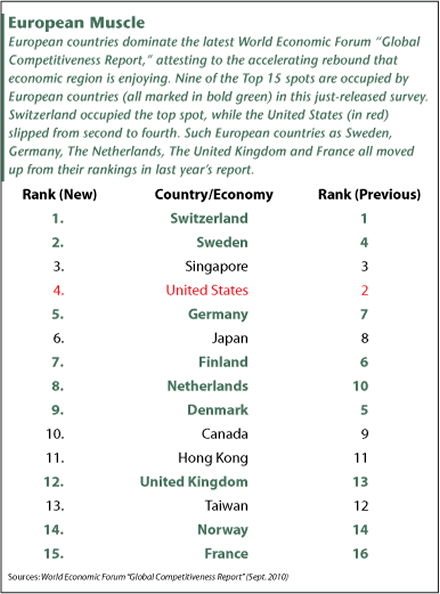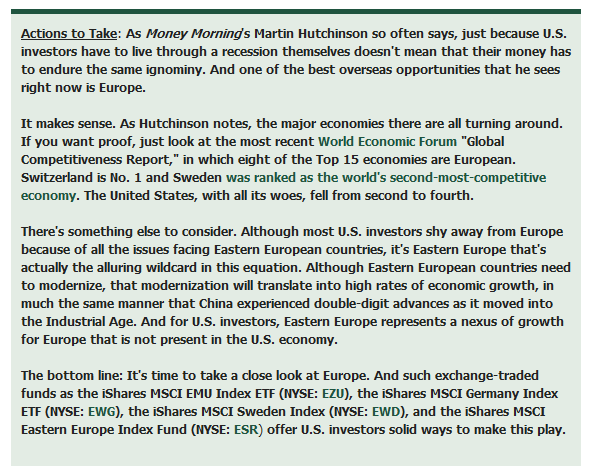Investor European Escape Hatch From the U.S. Recession
Stock-Markets / Investing 2010 Sep 16, 2010 - 07:41 AM GMTBy: Money_Morning
 Martin Hutchinson writes:
When I speak with the U.S. subscribers to my Permanent Wealth Investor advisory service, there's one bit of wisdom that I repeat time and again: Just because you're living through a recession doesn't mean that your money has to.
Martin Hutchinson writes:
When I speak with the U.S. subscribers to my Permanent Wealth Investor advisory service, there's one bit of wisdom that I repeat time and again: Just because you're living through a recession doesn't mean that your money has to.
If that's a high-falutin way of telling folks to invest globally, so be it. The reality is that there are other places to invest than in the U.S. economy - and many of those "other" spots offer much better returns.
Take Europe...
The European Commission recently upgraded its forecast for European Union (EU) growth from 0.9% to 1.7%. At first glance, that doesn't sound overly impressive.
But drill down.
That growth projection is an overall average for the entire EU, and is dragged down by a number of Mediterranean basket cases. Hidden within that seemingly mediocre average are some real investment gems.
Besides, Europe is on a significantly different economic track to the United States currently, which makes it an interesting diversification.
The Greek debt crisis has kept many U.S. investors scared and at bay. Yet, by causing the European euro to weaken, Greece's financial woes have paradoxically helped growth rates in the healthy parts of the EU - which are the bits that investors should be interested in.
The biggest growth engine of the EU is Germany, now expected to grow at 3.4% this year - equivalent to a 4.4% growth rate in the United States because Germany has zero population growth compared with the 1% growth rate of its U.S. counterpart.
Britain's growth projections have actually been revised up to 1.7% and its prospects look a lot better than they did earlier this year. Other bright spots and their projected growth rates include:
•Sweden, forecast to grow at 3.5%.
•Slovakia (3.5%).
•And Poland (3.0%).
Europe is currently on a significantly different economic track than the United States, which makes it an interesting diversification. On the negative side, it has few natural resources (relative to its population). Furthermore, most of its work force is relatively well paid by global standards, suggesting that European living standards may suffer some erosion from further outsourcing to emerging markets.
Three Reasons to Bet on Europe
Europe's strengths far outnumber its weaknesses.
First, much of Europe's output is specialized, protected by technology (such as German machinery) or a dominant market position (as is the case with French wines). Unlike the United States, Europe does not run a balance-of-payments deficit with the rest of the world, and its stronger northern economies - such as Germany - run very substantial surpluses.
Second, although the EU has a larger public sector than the United States, it is not expanding it further through wasteful "stimulus" spending. Indeed, European leaders are actually attempting to rein in such outlays.
In particular, Europe is dealing with its dangerously over-generous social security systems. Germany is a paragon in this respect, with a retirement age of 67 instituted several years ago, but Italy has also recently increased its retirement age and even France is currently undergoing several weeks of "strike therapy" to boost its retirement age from 60 to 62. The efficiency gap between the European and U.S. public sectors is nowhere near as vast as it once was, and that gap is continuing to narrow.
Third, Eastern Europe represents a nexus of growth for Europe that is not present in the U.S. economy.
Some countries - such as Romania and Bulgaria - are still very inefficient and corrupt, but they are also poor and can be expected to grow rapidly as they bring their economies up to the overall European level. Other countries - most notably Slovakia, Poland and the Baltic states - have reformed enough to contribute actual muscle to the overall EU growth efforts, as well as continuing to grow rapidly as they converge on Western European standards of living.
Overall, in most of Eastern Europe, standards of education are very high - at least at the high school level and in technical areas - meaning those countries should be able to develop the appropriate labor cost advantages that will make them attractive centers for manufacturing.
 The most important reason for having some of your portfolio in Europe is simple diversification; your risks, political and economic, are different from the United States, the areas of strength are also generally different, and the economic cycles do not always coincide. Currently, the prospects for growth in Europe's stronger countries look better than those of the overall U.S. economy, and so we should capture this trend.
The most important reason for having some of your portfolio in Europe is simple diversification; your risks, political and economic, are different from the United States, the areas of strength are also generally different, and the economic cycles do not always coincide. Currently, the prospects for growth in Europe's stronger countries look better than those of the overall U.S. economy, and so we should capture this trend.
Without going into the merits of individual companies, there are a number of exchange-traded funds (ETFs) that you might consider, including several that specialize in the particular countries that look attractive.
Those funds consist of:
•The iShares MSCI EMU Index ETF (NYSE: EZU), which invests in the MSCI index covering the whole Eurozone. At $825 million, this ETF has attained a decent size. It also has a reasonable expense ratio of 0.55%, trades at an overall average Price/Earnings (P/E) ratio of 12, and offers a very nice 3.0% yield.
•The iShares MSCI Germany Index ETF (NYSE: EWG), which covers Germany, currently Europe's strongest economy. Germany is an export dynamo recovering rapidly on the basis of some of the world's soundest economic policies. At $1.5 billion, with a 0.55% expense ratio, this Germany-focused ETF should be a core holding of any portfolio, even if the other investments in that portfolio are mostly domestic. This ETF trades at 12 times earnings, and pays a decent yield of 1.5%.
•The iShares MSCI Sweden Index (NYSE: EWD). U.S. investors tend to view Sweden as a lethargic, socialist economy. However, the reality is that - following a horrid crisis in the 1990s - Sweden has enjoyed a self-directed makeover. In fact, the World Economic Forum has just rated Sweden the world's second-most-competitive economy, ahead of the United States, which fell to fourth place. EWD is a $250 million fund, with a low 0.55% expense ratio; the P/E is a bit higher at 15 times earnings, but the yield is a fairly nice 2.49%.
•The iShares MSCI Eastern Europe Index Fund (NYSE: ESR) is a small fund, at only $13 million, but it gives you access to the growth areas of Eastern Europe, where it is very difficult for U.S. investors to invest directly. Its expense ratio is a little higher, at 0.7%. But it carries an ultra-low P/E of 7.0: The combination of a low P/E and high growth prospects is one that I'll take almost every time.

[Editor's Note: Money Morning's Martin Hutchinson continues to make money for his readers by being right on the money with his predictions.
Just look at some of his most recent market calls. Earlier this year, just a week after Hutchinson recommended Germany, the European keystone reported much-stronger-than-expected GDP growth. He recommended Chile back in December, and three of the stocks he highlighted have posted double-digit returns - and one is up nearly 25%. He again recommended Korea - which analysts were downgrading - only to have the traditionally conservative International Monetary Fund (IMF) come out with an upgraded forecast that projects solid growth for that Asian Tiger for this year and next.
A longtime international merchant banker, Hutchinson has a nose for profits instincts - as evidenced by his unerring ability to paint a picture of what's to come. He's able to show investors the big profit opportunities that are still over the horizon - while also warning us about the potentially ruinous pitfalls hidden just around the corner.
With his "Alpha Bulldog" investing strategy - the crux of his Permanent Wealth Investor advisory service - Hutchinson puts those global-investing instincts to good use. He's managed to combine dividends, gold and growth into a winning, but low-risk formula that has developed eye-popping returns for subscribers.
Take a moment to find out more about "Alpha-Bulldog" stocks and The Permanent Wealth Investor by just clicking here. You'll find the time well spent.]
Source : http://moneymorning.com/2010/09/16/europe-2/
Money Morning/The Money Map Report
©2010 Monument Street Publishing. All Rights Reserved. Protected by copyright laws of the United States and international treaties. Any reproduction, copying, or redistribution (electronic or otherwise, including on the world wide web), of content from this website, in whole or in part, is strictly prohibited without the express written permission of Monument Street Publishing. 105 West Monument Street, Baltimore MD 21201, Email: customerservice@moneymorning.com
Disclaimer: Nothing published by Money Morning should be considered personalized investment advice. Although our employees may answer your general customer service questions, they are not licensed under securities laws to address your particular investment situation. No communication by our employees to you should be deemed as personalized investent advice. We expressly forbid our writers from having a financial interest in any security recommended to our readers. All of our employees and agents must wait 24 hours after on-line publication, or 72 hours after the mailing of printed-only publication prior to following an initial recommendation. Any investments recommended by Money Morning should be made only after consulting with your investment advisor and only after reviewing the prospectus or financial statements of the company.
Money Morning Archive |
© 2005-2022 http://www.MarketOracle.co.uk - The Market Oracle is a FREE Daily Financial Markets Analysis & Forecasting online publication.



